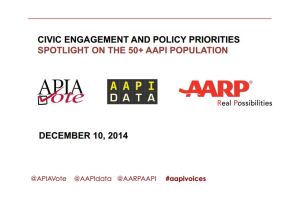by Ben de Guzman, the National Managing Coordinator for the Diverse Elders Coalition.
Last week, AARP was busy in the Asian American/ Pacific Islander (AAPI) community. On December 9, they issued a report entitled “Are Asian Americans and Pacific Islanders Financially Secure?” Billed as “an AARP report about the economic well-being of AAPIs age 50+”, results from a 2013 AARP study of Chinese and Filipino Americans, Census data, and survey data of English speaking Asian Americans from Scarborough Research, and other cited sources (including DEC partner National Asian Pacific Center on Aging) were synthesized to reveal major findings about financial security among AAPI communities in the United States.
Among the notable findings:
- AAPIs above the age of 65 are more economically vulnerable than their cohorts in the general U.S. population because they are less likely to have access to safety net programs such as pensions and Social Security
- AAPIs in 50+ households spend more compared to other U.S. 50+ households, but AAPIs tend to live in larger households that consist of intergenerational and extended families. The increased consumer spending is more a reflection of higher consumption because of larger households
- While AAPI home ownership among seniors is generally at parity with the U.S. 65+ population, AAPIs are more likely to be still making mortgage payments
- AAPIs with limited English proficiency that in general, have less access to financial opportunities, are not doing as well as AAPIs who speak English
The Korea Times picked up the story of the report’s release, noting that Korean Americans 65+ had the lowest income average of all the Asian populations.
The very next day, AARP, co-hosted a webinar that examined political behavior and civic engagement activities of AAPIs above the age of 50. In partnership with APIA Vote, a national non-profit focused on political and civic engagement in the AAPI community and AAPI Data, a repository of research and data on AAPI communities, AARP convened speakers that provided key information about how AAPIs over 50 voted in the 2014 elections, as well as how they participated in non-partisan political and civic engagement activities.
 Some important statistics from the data portion of the webinar include:
Some important statistics from the data portion of the webinar include:
- AAPIs over 50 represent both the fastest growing segment of the 50+ population, AND the fastest growing segment of the AAPI population
- Lower rates of citizenship help explain lower rates of voter turnout among AAPIs, but while voter turnout is higher among the 50+ segment across all racial/ ethnic groups, the gap between AAPIs who are older than 50 and the overall population is less (85% for AAPIs 50+; 84% for AAPIs overall) than the gap for the general population (91% for all voters 50+; 97% for all voters of any age)
Like AAPIs of all ages, AAPIs 50+ are contacted least by political organizations compared to other racial/ ethnic groups, but also exhibit the highest number of voters who don’t affiliate with either party, representing in many ways, a lost opportunity across the board for either party to engage what is arguably the fastest growing and most likely to vote segment of the population. All of the data from the webinar is available on APIA Vote’s web site: http://www.apiavote.org/research
The following sections included information about civic engagement and non-partisan voter registration drives. Often, AAPI elders turned out to be the most active participants in these activities. Their voices brought different perspectives to bear in reaching out to the electorate, including experience in years of political history, an immigrant lens on new voters, and respected roles in the community.
With knowledge about the ongoing need for more data on AAPIs, especially disaggregated data that understands the differences between ethnic sub-groups, and data that captures information about AAPIs with Limited English Proficiency that is gathered in their native languages, organizations like AAPI Data, APIA Vote, and AARP are working hard to close the knowledge gap about our communities.
Many thanks to the team at AARP (including Daphne Kwok, Maj. Gen. Tony Taguba, Steven Raga, and June Kao), Karthick Ramakrishnan and AAPI Data, and the APIA Vote team (including Christine Chen and Eric Salcedo).
The opinions expressed in this article are those of the author and do not necessarily reflect those of the Diverse Elders Coalition.

